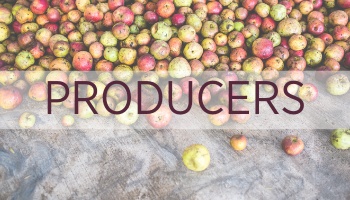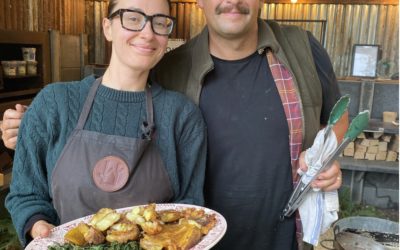By Nutritionist Dr Lucy Williamson
The benefit of gut health starts in the soil: the origins of our food
More and more of our food producers are farming with nature – planting for pollinators and encouraging biodiversity. These healthy soils, with just one handful containing a larger population of microbes than people on earth, enable crops to absorb more nutrients as they grow. Our own ecosystem of gut flora, the billions of microbes in our gut, activate many of these nutrients for us, like anti-ageing antioxidants found in colourful fruit and veg and oily fish too.
Fibre, that part of carbohydrate which we can’t digest ourselves, is fermented by our microbes to produce compounds for us (postbiotics) with vital roles in our health, like controlling inflammation, known to be a driver of chronic illness such as cancer, heart disease & Type 2 Diabetes as well as promoting digestive wellness. Our gut microbes provide building blocks for our vitamins and hormones like Serotonin, our happiness hormone, and even impact our mental wellbeing and mood thanks to chemical messengers they provide for our ‘Gut-Brain axis’.
What about our Immunity?
Most of the cells of our immune system sit within the wall of our gut. Our gut bacteria here help to regulate our immune cells, making sure they respond well when needed to prevent infection but not excessively so, as in auto-immune disease (like Inflammatory Bowel Disease and Rheumatoid Arthritis). Medical researchers are currently exploring these links with our gut bacteria further. Our immune system thrives of course on a healthy, balanced diet, but nurturing our microbes will really help, especially through the winter months.
Nurturing our inner garden of microbes is easy to do
As well as every-day plant-based eating & choosing less-processed food, our gut bacteria thrive on a period of fasting we know as sleep, keeping active and living closer to nature, all of which help to reduce stress. There’s no doubt that eating a rainbow of fibre-rich seasonal fruit and vegetables, highly nutritious thanks to short ‘farm to plate’ journeys, pulses, beans and wholegrains is key.
But a ‘plant-based’ diet need only be two thirds’ plants, meaning our health can still benefit from the many ‘hidden’ nutrients in sustainably sourced dairy, fish, eggs and meat. Pasture-fed beef for example, is a farming system which nurtures the gut health of cows by rearing them only on their natural diet of grasses.
Their gut bacteria ferment these, allowing cows to convert our inedible grass into highly nutritious milk and meat. Cows reared this way produce meat higher in healthy unsaturated fats and Vitamin E thanks to healthy soils, the diet they were designed to eat and their lower stress, more placid lifestyle.
Fermented foods
These provide us with nature’s ‘probiotics’, natural bacteria and yeasts which help to increase the variety of our own gut microbes. Bio-live yogurt, kefir, sauerkraut and matured cheese are great choices. The natural fermentation in probiotic foods also gives us those valuable postbiotics.
Take raw, unfiltered apple cider vinegar for example, its natural yeasts and bacteria work in harmony to produce acetate, known to help reduce blood sugars, cholesterol, weight loss and aid digestion – try it in a vinaigrette or marinade! Sourdough can be an effective alternative to ‘gluten-free’ as its gluten is largely broken down already by fermentation, or try Kombucha, a non-alcoholic fermented tea!
The journey ahead for our health…
These simple ways to nurture our gut health make a big impact – in as little as 48 hours our gut bacteria multiply and become more diverse, with the same ‘rewilding’ benefits to our health as biodiversity within nature. As our British farmers move towards regenerative agriculture and we all reconnect with our land, nurture your gut health, take rest, gift yourself time in nature to destress and enjoy natural, seasonal, nutrient-rich food. Your microbes and your health will thank you for it!
FURTHER READING: TIPS ON SOURCING BRITISH PRODUCE TO HELP RE-WILD YOUR GUT
A supplier of beans and pulses from British farms called Hodmedods support British farmers by producing organic pulses, grains and pioneering, fibre-rich crops like quinoa and chia seeds – winter porridge has never tasted better!
How about seasonal vegetables?
Seasonal brassicas and root vegetables – with their fibre, vitamins A and C, and antioxidants – are another source of nutrition. For a really healthy Sunday roast, try roasting your vegetables in British cold-pressed rapeseed oil, which has the lowest saturated fats of all plant oils.
Its high smoke point also prevents nutrient damage. Hillfarm Oil from Suffolk is rich in colour, flavour and nutrients thanks to this very natural production process, being farmed with maximum biodiversity to allow nature and soil health to thrive.
Should we be drinking probiotics throughout the winter months?
Fermented foods and drinks are natural probiotics which can boost our own bacteria. Try kefir, an ancient fermented milk drink, to benefit from the invaluable nutrients in dairy too. With British welfare standards among the highest in the world and our maritime climate providing plentiful grass which cows efficiently convert into highly nutritious milk, it’s a surprisingly sustainable choice.
Alternatively, kombucha – a fermented, loose-leaf tea – makes a wonderful, non-alcoholic alternative to sparkling wine. REAL Kombucha in Buckinghamshire is a very popular choice with top chefs – also available as natural organic energy drinks from WillysACV.
GOURMET GIFT IDEAS: See Dr Lucy’s gifts below, featuring many of her recommended British producers.
Dr Lucy Williamson works with British food producers to provide nutrition support, enabling them to effectively communicate the health benefits of their produce. She’s also Ambassador and Nutritionist for the Love British Food campaign and Visiting Lecturer at Hertfordshire University. She was shortlisted for the Caroline Walker Trust Freelance Nutritionist of the Year Award 2020. Visit lwnutrition.co.uk














